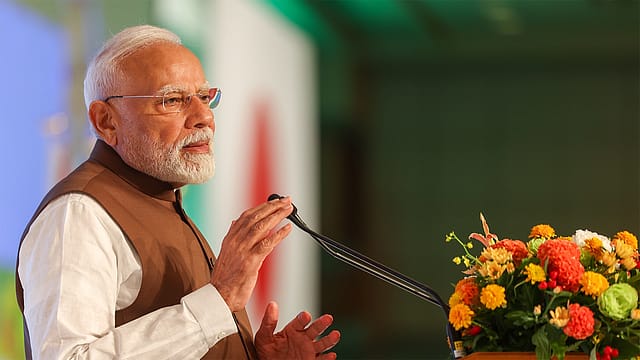India is a springboard for Japanese businesses to the Global South: PM Modi
ADVERTISEMENT

Prime Minister Narendra Modi on Friday said that India is a springboard for Japanese businesses to the Global South, highlighting that the two countries can build on their successful partnership in the auto sector by extending it to areas including batteries and semiconductors.
“Our partnership in the auto sector has been really successful. We can repeat this magic with batteries, robotics, semiconductors, shipbuilding and nuclear energy sectors. By coming together, we can play an important role in the development of the Global South, especially Africa,” Modi said while addressing business leaders in Japan.
“The success stories of Suzuki and Daikin can become your success stories too,” the prime minister said, urging Japanese companies to ‘Make in India’ for the world.
India’s automobile industry is dominated by Japanese carmakers with Suzuki, Toyota and Honda cornering nearly 50% share of India’s passenger vehicle market.
Japan’s technology and India’s talent together can lead the tech revolution of this century, said the prime minister.
“Japan is a tech powerhouse. India is a talent powerhouse... Japan’s technology and India’s talent together can lead the tech revolution of this century,” Modi said.
The prime minister noted that Japan has been an important partner in India’s journey to Viksit Bharat. “From metro to manufacturing, semiconductors to start-ups, our partnership in every field has been an example of mutual trust,” Modi said. “Japanese companies have invested over $40 billion in India,” he added.
January 2026
Netflix, which has been in India for a decade, has successfully struck a balance between high-class premium content and pricing that attracts a range of customers. Find out how the U.S. streaming giant evolved in India, plus an exclusive interview with CEO Ted Sarandos. Also read about the Best Investments for 2026, and how rising growth and easing inflation will come in handy for finance minister Nirmala Sitharaman as she prepares Budget 2026.
Citing a Japan External Trade Organization (JETRO) report, PM Modi said that 80% Japanese companies want to expand in India. “70% firms are already profitable. That means in India, capital does not just grow, it multiplies.”
“Today, India is the world’s fastest-growing major economy. And soon, India will become the world’s third-largest economy. India’s contribution to the world GDP is 18%. India’s capital markets are giving good returns,” said the prime minister.
India is looking to introduce more reforms, said Modi. “We have opened sensitive defence and space sectors to private companies. We are also opening up the nuclear energy sector. “Through these reforms, our commitment, conviction and strategy is to become a developed nation by 2047.”
By 2030, India plans to achieve 500 GW renewable energy target. By 2047, India is targeting 100 GW of nuclear power. “There are many possibilities in solar cells and green hydrogen. There has been an agreement on joint credit mechanism between India and Japan. It can benefit clean and green future,” said Modi.
After two decades, S&P Global upgraded India’s credit ratings recently, said Modi. “The world is not just watching India. It is counting on India.”
